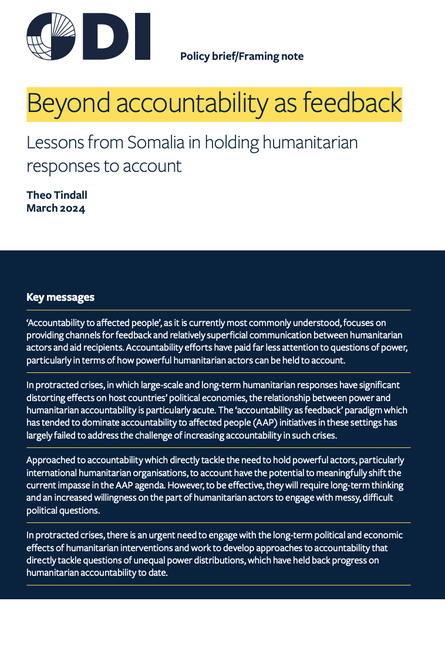
In prolonged crises, the slow progress of efforts to advance the accountability to affected people (AAP) agenda is well-documented, even as increasing volumes of frameworks, commitments and analyses are dedicated to the issue of AAP and the humanitarian sector’s shortcomings in it. Efforts to improve humanitarians’ approach to accountability have, even by the sector’s own standards and measurements, lagged behind those in other areas. As such, practitioners and academics have increasingly questioned not only the effectiveness of various efforts to improve AAP but whether the AAP agenda is fundamentally asking the right questions (Diepeveen et al., 2024).
This briefing note offers an initial examination of accountability and the AAP agenda, indicating how in its current form it has focused on a relatively limited form of accountability, centred on ‘giving’ and ‘taking’ account, at the expense of engaging with thorny questions of power, which efforts to hold humanitarian actors to account would demand. It explores how these limitations have played out in the humanitarian response in Somalia, to illustrate the shortcomings of current AAP initiatives to bring about meaningful accountability and the key challenges that future efforts will have to address to increase community voice and make humanitarian actors more accountable.
Key Messages
- ‘Accountability to affected people’, as it is currently most commonly understood, focuses on providing channels for feedback and relatively superficial communication between humanitarian actors and aid recipients. Accountability efforts have paid far less attention to questions of power, particularly in terms of how powerful humanitarian actors can be held to account.
- In protracted crises, in which large-scale and long-term humanitarian responses have significant distorting effects on host countries’ political economies, the relationship between power and humanitarian accountability is particularly acute. The ‘accountability as feedback’ paradigm which has tended to dominate accountability to affected people (AAP) initiatives in these settings has largely failed to address the challenge of increasing accountability in such crises.
- Approached to accountability which directly tackle the need to hold powerful actors, particularly international humanitarian organisations, to account have the potential to meaningfully shift the current impasse in the AAP agenda. However, to be effective, they will require long-term thinking and an increased willingness on the part of humanitarian actors to engage with messy, difficult political questions.
- In protracted crises, there is an urgent need to engage with the long-term political and economic effects of humanitarian interventions and work to develop approaches to accountability that directly tackle questions of unequal power distributions, which have held back progress on humanitarian accountability to date.